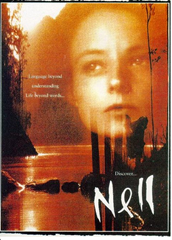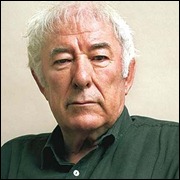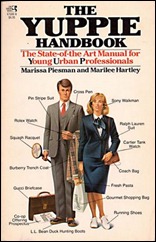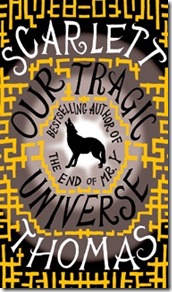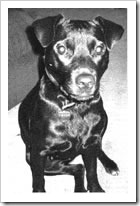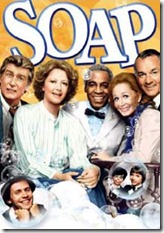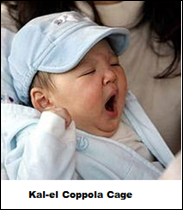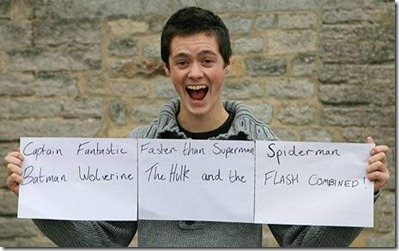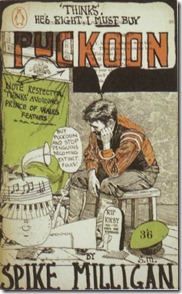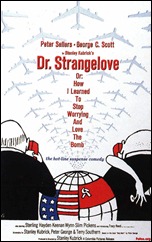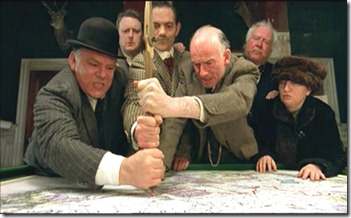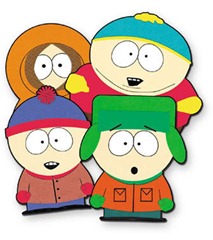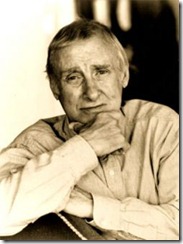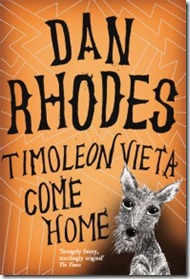 Timoleon Vieta Come Home is an odd book. It is the fourth book by Dan Rhodes that I’ve read and so I was expecting an odd book. Expectations are dangerous things and personally I’m thinking of giving them up. I’ve clearly not got the hang of them. Does this mean that Timoleon Vieta Come Home was a disappointment? No, far from it. And I can see elements of his previous work in this book – it’s definitely a Dan Rhodes book and people who have read his other stuff would do well to consider reading it – but it wasn’t what I expected. I expected a novel – it’s billed as his first novel – but what I got was half a novel and a collection of short stories. That I didn’t expect. It’s certainly a novel approach to telling a story.
Timoleon Vieta Come Home is an odd book. It is the fourth book by Dan Rhodes that I’ve read and so I was expecting an odd book. Expectations are dangerous things and personally I’m thinking of giving them up. I’ve clearly not got the hang of them. Does this mean that Timoleon Vieta Come Home was a disappointment? No, far from it. And I can see elements of his previous work in this book – it’s definitely a Dan Rhodes book and people who have read his other stuff would do well to consider reading it – but it wasn’t what I expected. I expected a novel – it’s billed as his first novel – but what I got was half a novel and a collection of short stories. That I didn’t expect. It’s certainly a novel approach to telling a story.
The book opens with a quote from Lassie Come-Home by Eric Knight:
...dogs are owned by men and men are bludgeoned by fate.
It is an appropriate quote. Timoleon Vieta is no Lassie however:
Timoleon Vieta was the finest breed of dog. He was a mongrel.
The self-conscious preening, superior airs and inbred neuroses of the pedigree were not for him. His heritage was clearly such a mess that any attempt to untangle it could only be a futile exercise. Even so, its very mystery had served to revive a few flagging conversations as people scrutinised him and saw beauceron in his coat, a touch of Swedish Vallhund in his outsized ears, something Nordic in the slight curl of his tail, pinscher in his gait, or sloth in the way he so often lay on the ground or in the armchair he had made his own. But really there was nothing much to go on, and nothing pure to save.
So opens the novel and that’s as much as the first page has to say. The second describes the dog – “black with occasional spots of white and tan” – and takes a guess at his age, seven, or thereabouts. The only thing that distinguished him from any of the local strays was that he clearly had an owner who doted on him and his “eyes were as pretty as a girl’s.”
So ends the opening chapter and potential readers of the book will have been unlikely to have read further. They, dog lovers especially, will have assumed this was going to be a heart-warming tale of a dog that falls on hard times but rises to the challenge and everything works out well for him in the end, a kind of canine Oliver Twist perhaps. And, if this was the first book by Dan Rhodes that they had read one might forgive that supposition but this is Dan Rhodes we’re talking about here and he doesn’t write books like that.
When I wrote this review there were 47 reviews on the Amazon website and their palindromic arrangement really says everything:
5 star – 14
4 star – 7
3 star – 5
2 star – 7
1 star - 14
A sample then:
I have never thrown a book away before, but don't want to be responsible for anyone else feeling fondly for the dog and then enduring his end – penfold
It is one of the most beautiful tales ever written about unconditional love and the essence of being. – universe1763
Penfold was not the only person to consign this book to the bin. Lynda Kelly did the same: “[I]t went in the bin because in no way was I going to make someone else feel the way I did.”
Now hang on a cotton-picking minute, isn’t this supposed to be a funny book? Doesn’t Dan Rhodes write them thar funny books? Well, yeah, but a lot depends on what you find funny. The Observer calls the book:
A delight, a masterpiece of beautifully unforced comedy.
I’m not so convinced about the comedy bit. I think it’s misleading. The book didn’t have me clutching my sides. I don’t think I even cracked a smile. It wasn’t that kind of funny. There are lots of funnies in this book: funny-ha-ha, funny-strange, funny-ironic and funny-downright-deceitful.

When we first meet Timoleon Vieta he is owned by the pseudonymous Carthusians Cockcroft (showbiz people tend to do that), a once successful "bandleader and bon viveur", a composer of pop music for television and stage who, after a thoughtless remark about the number of foreigners in the UK during a TV interview, had fallen from grace faster than Simon Dee and Gerald Ratner combined and is now living on a small pension and irregular royalties whilst wallowing in past glories in a rundown farmhouse in Umbria:
I tried to explain, but nobody would listen. I tried to apologise. I called the newspapers, but they just weren’t interested in doing anything other than burying me alive or make me look stupid in cartoons. I wanted to tell them that I hadn’t meant it, but I could hardly say I had been cruelly abandoned that morning by a Moroccan businessman, and that I was having some kind of personal crisis. I was only racist for a day. Everyone’s racist for a day at some point in their lives.
He is desperately lonely. He is also, as you may have gathered from that quote, desperately homosexual. He wants to be loved but has learned to settle for occasional breaks in his isolation when these come his way.
His neighbours are also all ex-pats but they have quickly tired of him. They keep writing "how-we-did-up-our-house" books with cringeworthy titles like Olive Oil and Sunset: an Umbrian odyssey. There are occasional short-lived flings, but his only constant companion is his dog. His last great (possibly one true) love was a boy in silver shorts with long blond hair and both a penchant and a talent for pleasuring old queers. To Cockcroft's dismay, the boy has fallen into the clutches of his archrival, Monty ‘Misty’ Moore, his onetime collaborator on a doomed musical, Wrens. Cockcroft’s big success was writing the music to a Seventies children's TV programme called Bibbly and the Bobblies which gets a revival during the course of the book  due to cult following by drug-addled student sorts; a clear nod to the Teletubbies there I would have thought.
due to cult following by drug-addled student sorts; a clear nod to the Teletubbies there I would have thought.
So desperate is he for anything resembling affection that he throws his arms around and his home wide open to a morose stranger who appears on his doorstep one morning; a man he had run into during a drunken weekend in Florence when he was handing out business cards willy-nilly to every Tom, Dick or Harry who took his fancy – straight or gay – offering board and lodging in exchange for companionship and a little fellatio each Wednesday evening at seven. It is an offer he’s made many times, half in jest, and he’s never seriously expected any takers.
‘The Bosnian’ is not the slightest bit gay and is as Balkan as I am (he’s “never even been to Bosnia, and ... wasn't sure he'd be able to find it on a map”) but he is in a bit of bother and has decided this would be a safe, out of the way place to lie low. Although basically a nasty piece of work, like Flashman, he is not entirely unprincipled and a deal is a deal. So every Wednesday he feels honour bound to knock on Cockcroft’s bedroom door and cough up his rent. Better than “spunky biscuits” – don’t ask. The irony is that Cockcroft would have kept him round sex or no sex. His demands are so basic that he never even presses ‘The Bosnian’ for a name and we readers only find it out on page 303 of the 305-page book.
The dog is a far better judge of character than his master and makes it obvious that he doesn’t like ‘The Bosnian’; the feeling is mutual. His master, however, is putty in ‘The Bosnian’s’ hands though and no sooner has he usurped the dog’s seat in the car than he manages to persuade Cockcroft to let him take his pet far away and abandon him; it’s either that or wait until the dog goes for him whereupon he insists that he would be unable to stop himself breaking the creature’s neck:
‘It is nature. He attack me and he will die,’ he said, mimicking a karate chop. ‘I am from Bosnia, and in Bosnia we are killing the dogs all the time with only our hands.’ Again he mimed a karate chop.
‘Oh no. You can’t do that.’
[...]
The thought of living alone frightened Cockcroft as much as it always did before it happened, but he loved Timoleon Vieta to distraction even though the dog seemed to have gone cool on him.
He presses him but so desperate is Cockcroft to both hang onto ‘The Bosnian’ and protect his dog that he acquiesces. And so, on page 119, Timoleon Vieta is summarily dumped in Rome, in front of the Colosseum Here our half-a-novel comes to an end.
 The plot summary for Lassie Come Home reads as follows:
The plot summary for Lassie Come Home reads as follows:
Hard times came for Carraclough family and they are forced to sell their dog to the rich Duke of Rudling. However, Lassie, the dog, is unwilling to leave the young Carraclough boy and sets out on the long and dangerous journey from Scotland to Yorkshire in order to rejoin him.
This is how the second half of this book plays out, part The Littlest Hobo and part The Yellow Rolls-Royce. Lassie was always saving the day which is not really the case here. He’s just there. In all of the stories he has a cameo – a fleeting vision of hope perhaps? – and then moves on. Yes, Timoleon Vieta has an incredible journey (another movie reference) ahead of him but strangely Rhodes focuses less on him than the lives he touches.
The titles of the stories are the names that he acquires on the way: Abbondio, Teg, Something Chinese, Giuseppe or Leonardo da Vinci, Dusty and Henri. The last ‘story’ is actually the last chapter of the novel-proper where we find out what happens to the original trio. Considering how little time the dog spends in each of the six stories you might be surprised to find that he gets renamed but he does and it works.
For my money these six twisted tales are worth the price of the book alone.
In ‘Abbondio’ we find out what happens immediately after ‘The Bosnian’ drives away when a policeman who realises what’s going on tries to befriend the dog which he hopes to present to his wife as a new pet.
Timoleon Vieta’s longest stay in any of the stories is in ‘Teg’ where he keeps company with a Welsh girl who has travelled to Rome to be with Enrico, the man she loves, only to find out that he wasn’t quite what he had claimed to be. The dog meets her beside the Trevi Fountain after she’s thrown her now ex-boyfriend out of her hotel room. She’s eating “a bar of horrible Italian chocolate”:
The dog shuffled closer. She looked at him, and he cocked his head to one side. ‘All right then. One piece,’ She threw it high, and the dog leapt up and caught it. She wasn’t enjoying the chocolate at all, but she knew its importance in times of trouble. She had read that eating chocolate was supposed to be like having sex. It was something to do with chemicals. She thought about that for a while. Eating chocolate was probably better than having sex with her old boyfriend, but it didn’t come close to being as good as having sex with Enrico. Having sex with Enrico in Tenby had been the best thing she had ever done. She broke off and ate another square.
In ‘Something Chinese’ we learn how Shanghai-born Mai ends up living with an old professor of Sinology in Italy.
‘Giuseppe, Or Leonardo da Vinci’ is a story very similar to the second storyline in Little Hands Clapping in fact the whole book has a similar feel, a darker outer shell around a sweet centre. This particular tale concerns a predestined love affair between a sweet, deaf girl and the town’s juvenile delinquent and how the girl tries to cheat fate and the awful consequences.
In ‘Dusty’ the dog enters the life of Pietro at a critical moment while his severely retarded and terminally ill daughter lies dying. By the end of this story Timoleon Vieta is almost home and then fate steps him and he has to begin his journey afresh only by now he is far from fresh. It is a setback but the little dog rises to the challenge.
‘Henri’ takes place almost entirely in Cambodia. It is the story of Malic and the French dentist who ends up fixing her teeth before marrying her sister Morakot and taking her to live in France. Before they settle the couple plan a trip of Europe and who do you think they end up feeding crisps, biscuits and more chocolate to in Pisa?
Malic’s favourite photograph was the one where her sister was standing in front of the lopsided tower in Italy. Sitting by her side, and looking longingly up at her was a scruffy dog, Morakot had told her all about how the dog had followed them from the street outside their guest house, and that it seemed so nice and friendly that they hadn’t wanted to chase him away. They had named him Henri, after one of the dentist’s friends in Phnom Penh.
These are all short tales, parables almost, of love, loss and betrayal and all of them are stunning. But none of them are especially funny, not funny-ha-ha anyway. And that’s fine as long as you’re not expecting funny-ha-ha.
In the final chapter of the book ‘Timbo’ makes it home for the second time and you’ll have worked what might happen or you won’t. I’m not telling you. Like everything to do with Dan Rhodes it’s a little twisted My personal feeling is that he takes the easy option and ties things up a little neatly, albeit in his own fashion. One thing I didn’t mention earlier is that Timoleon Vieta is a mongrel with a coat "of various, apparently random lengths", i.e. a shaggy dog. Wikipedia defines the shaggy-dog story as follows:
In its original sense, a shaggy dog story is an extremely long-winded tale featuring extensive narration of typically irrelevant incidents, usually resulting in a pointless or absurd punch line. ...
Shaggy dog stories play upon the audience's preconceptions of the art of joke telling. The audience listens to the story with certain expectations, which are either simply not met or met in some entirely unexpected manner.
And that’s as much as I’m going to say about the ending.
If the book has a weakness it’s the two main characters, both living under false names, both pretending to be (or aspiring to be) what they’re not. Neither is an especially likeable character and even when both back stories are revealed I didn’t find myself with much sympathy for either of them. There is also a danger in writing a tragic-comic camp character that he veers into caricature and Cockcroft does feel at times like a poor man’s Liberace.
 By the way apparently "Timolean Vieta" and "Carthusians Cockcroft" were printed on the spines of volumes 22 and 5 respectively of the 14th edition of the Encyclopaedia Britannica. Cockcroft's piano is also a "Spelman Timmins" (volume 21). I should also mention that between chapters there is occasionally a childlike picture of a dog, accompanied by a phrase like, 'Sharing everything sweet and delicious with lovely master', 'May I continue living with my master forever and forever...?' or 'It's true that I'm living in a world flooded with the light of love.' These were part of the original manuscript that Rhodes submitted. On his website he explains:
By the way apparently "Timolean Vieta" and "Carthusians Cockcroft" were printed on the spines of volumes 22 and 5 respectively of the 14th edition of the Encyclopaedia Britannica. Cockcroft's piano is also a "Spelman Timmins" (volume 21). I should also mention that between chapters there is occasionally a childlike picture of a dog, accompanied by a phrase like, 'Sharing everything sweet and delicious with lovely master', 'May I continue living with my master forever and forever...?' or 'It's true that I'm living in a world flooded with the light of love.' These were part of the original manuscript that Rhodes submitted. On his website he explains:
In the closing months of writing Timoleon Vieta Come Home I was having a bastard of a time finding the right pitch for my eponymous mongrel. I wanted him to be a normal, resolutely un-anthropomorphic dog, but I still wanted the story, just occasionally, to drift over to his point of view. Hmmm… I was stuck. The solution came when I met Vien Thuc, a Buddhist monk from the city of Dalat in the Central Highlands of Vietnam.
Vien Thuc shares his pagoda with a pack of ragged mongrels who, at least in silhouette, answer the description of Timoleon Vieta that I had written years before. As fortune would have it he paints pictures of them, in silhouette, accompanied by perfectly worded canine thoughts. His dogs are innocence itself, living only in the present where they pass the time dreaming of food and their master, and idly wondering what else they ought to be thinking about. His words are a million times better than anything I would have come up with, so I picked six canvases, bought them for the going rate then handed him a slim wad of fifties for the rights to use the images and words in the book. Back home I engaged in some rudimentary rostrum photography involving a stepladder and two pairs of trainers, and put his paintings into the manuscript at strategic points, where they became at once an integral part of the storytelling and of the design of the book.
On the whole I liked this book. I get why dog lovers might get up in arms about it but it’s only a book. The thing is the dog’s not the only thing that suffers in this book. There is a lot of pain and suffering (both physical and emotional) and death in this book and I didn’t see any of the dog lovers shedding a tear for the poor humans and what they had to go through. I actually thought that more people might object to all the gay stuff but that was barely mentioned. I don’t think this is his best book. I actually suspect he’s not written his best book yet. Writers, if no one else, will find his approach to the novel refreshing, perhaps not completely successful, but a good effort.
***
Rhodes despite having a Welsh surname and living in Edinburgh is actually an English writer. One of Granta magazine's Best of Young British Novelists 2003, his novel Timoleon Vieta Come Home won the Authors' Club First Novel Award and was shortlisted for the Mail on Sunday/John Llewellyn Rhys Prize. He is the winner of the 2010 E.M. Forster Award.
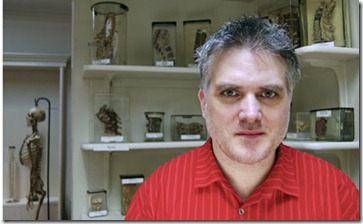
Born in 1972 he has worked in various jobs including stockroom assistant in a bookshop and teaching in Ho Chi Minh City. He says that 1980's band The Smiths are "still the soundtrack to my life – I can't work out if they saved it or ruined it". You can read my review of Gold here and my review of Little Hands Clapping here. The fourth book I’ve read was Anthropology, a collection of flash fiction which I may or may not get round to writing about some day.




